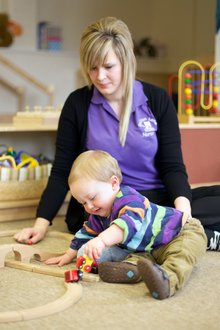As parents, we’ve all seen our children pushing the behaviour boundaries that we set them. But it can be worrying and frustrating when the child persistently behaves in a challenging way.
Attention Deficit and Hyperactivity Disorder (ADHD) is the name given to a list of behaviours, which include inattentiveness, hyperactivity and impulsiveness. It is not clear what causes it, but scientists believe that it may be triggered by problems in the part of the brain that controls impulses and concentration. It can also be associated with premature birth, head injuries, low birth weight and smoking, alcohol and drug abuse in pregnancy. It can run in families.
ADHD is diagnosed more often in boys as girls are more likely to display symptoms of inattentiveness only and less likely to show disruptive behaviour that can make the symptoms of ADHD more obvious, meaning that girls are not always diagnosed.
How can I tell if my child has ADHD?
The main signs of inattentiveness include a short attention span and being easily distracted; making careless mistakes, forgetfulness or losing things and an inability to stick to basic tasks.
Children who are hyperactive and impulsive may be unable to sit still or concentrate on tasks; they talk or move around constantly and may find it difficult to wait their turn. They may also interrupt conversations. Children with ADHD may have little or no sense of danger. The condition might affect their friendships and ability to get on with other children.
If your child has ADHD, you may find aspects of everyday life challenging, such as getting your child to sleep at night, getting them ready in the morning, and social occasions.
Although it is not always the case, children with ADHD may have other related issues such as such as anxiety, depression, attachment issues, sleep problems and epilepsy. They may also have underlying or associated conditions such as Autistic Spectrum Disorder, dyspraxia and Tourette’s Syndrome.
What should I do next?
Dr Joanna Goodman, who runs Cromwell Consulting, a specialist educational consultancy, said: “It can be difficult to diagnose ADHD in very young children because their behaviour might be put down to normal childhood development.
“But early diagnosis and intervention is vital if the child, and their family, are to be supported and helped adequately.”
This might include, for example, giving the child special attention in a nursery or pre-school setting. Dr Goodman advises bite-sized tasks with very precise instructions to keep the child on track and improve their behaviour.
She added: “Children with ADHD are usually thought to be badly behaved but actually their conduct is due to the fact they’re unable to cope. Where a child with ADHD also has autism they may suffer from sensory overload, which just makes the situation worse.”
However, Dr Goodman stresses: “ADHD must not be associated with low IQ. Although there are some links with learning difficulties, children with ADHD can be very intelligent and will thrive academically with the right support.
“It is important that ADHD is diagnosed early and that early years professionals are trained to know about the condition. They will need to have patience with the ADHD child, and to work closely with parents on effective strategies.”
There is no cure for ADHD. Medication is available that can regulate brain activity, but this comes with side effects, which mean that some doctors are against its use. The most effective, safest way to manage ADHD is to support your child with education training at home. If you suspect that your child might have ADHD, or you’re worried about their behaviour, you can speak to your GP or the key-worker in your child’s nursery or pre-school setting. If your child’s behaviour doesn’t improve, they might be sent for assessment by a paediatrician, special needs specialist or a child psychiatrist.
Further information:
http://www.adhdfoundation.org.uk/main-v1.php
http://www.nhs.uk/conditions/Attention-deficit-hyperactivity-disorder/Pages/Introduction.aspx
http://cromwell-consulting.com/
Written for the Early Years Alliance by Dorothy Lepkowska.







